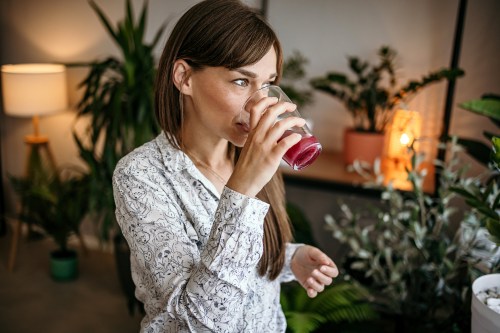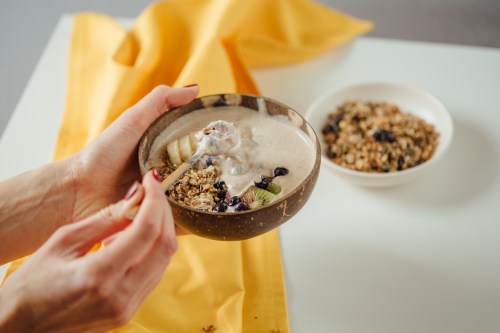Beware: Natural Cancer Treatments Are Trending Online, But Doctors Heed These Warnings
Some of the claims out there can be dangerous.

People can’t get enough of actor Parker Posey after playing the eccentric, lorazepam-popping Victoria Ratliff on HBO Max's The White Lotus. But the 56-year-old is raising eyebrows after her recent appearance on the Smartless podcast, where she suggested that going on a certain diet could "cure cancer."
Experts in This Article
an oncologist, associate dean for pediatric translational and population health research at the Jacobs School of Medicine and Biomedical Sciences at the University at Buffalo, and professor of oncology at Roswell Park Comprehensive Cancer Center
medical oncologist in the Gynecologic Oncology Department at Moffitt Cancer Center
division director at GW Cancer Center
medical oncologist and medical director of Integrative Oncology at MemorialCare Cancer Institute at Orange Coast and Saddleback Medical Centers in Orange County, California
The comments came while Posey talked about her experience at an Ayurvedic retreat, noting the different treatment options available based on people's health needs. While there's nothing inherently wrong with receiving holistic treatments, "there were people who had cancer who did the Ayurvedic [treatment]," she said on the podcast. "Through diet, they’ve healed themselves," she added.
Posey went on to mention a documentary she watched when her father dealt with prostate cancer, "which had an interview with all these people who said, ‘I’m not doing chemo. I’m just going to see what happens with my diet when I change it,'" she said. Then, Smartless co-host Will Arnett chimed in with his own story: "I’ve met two people in my life who had different forms of cancer who did similar things—who changed not just their diet but their lifestyle and were able to completely eliminate the cancer,” he says.
Arnett also told the story of a former firefighter with lung cancer who "quit his life," moved to California, and became a golf caddie. "He refused the chemo, and he beat it. He really did it," Arnett said.
But fans pushed back on this touchy conversation in the comments. "She lost me on the whole fake science B.S. about people healing their cancer through diet," one listener wrote. Another said they were "disappointed" by the talk around natural cancer treatments. People on Reddit even called the segment on cancer treatments "really disturbing" and "dangerous."
This is hardly the only chatter swirling online about so-called "natural cancer treatments." TikTok is packed with videos of people talking about diets to "heal" cancer. Plus, the Netflix docuseries Apple Cider Vinegar, based on the real events of influencers claiming natural remedies treated their cancer, also got a lot of buzz earlier this year.
With alternative treatments to less severe ailments floating into the mainstream right now, it's fair to have questions about the potential effects of things like diet on cancer treatment. For the record, the oncologists cited in this article stress that nothing can replace conventional, science-backed medicine, especially when treating cancer. However, there is some room in treatment regimens for natural therapies alongside standard treatments.
Here's what the experts want you to know about "natural cancer treatments," whether they can even cure cancer, and ultimately, whether you should add them to your recovery regimen, despite what the online chatter says.
What do 'natural cancer treatments' consist of?
This is a little tricky to say. "There is no good definition of 'natural' treatments,” says Ashley Davenport, MD, breast medical oncologist with The Ohio State University Comprehensive Cancer Center-Arthur G. James Cancer Hospital and Richard J. Solove Research Institute.
The term 'natural' is more common with average people than it is with doctors, says Kara M. Kelly, MD, an oncologist, associate dean for pediatric translational and population health research at the Jacobs School of Medicine and Biomedical Sciences at the University at Buffalo, and chair of pediatric oncology at Roswell Park Comprehensive Cancer Center.
"Some people perceive certain herbs, vitamin supplements, and dietary changes to be more 'natural' and not manufactured or processed by a pharmaceutical company," Dr. Kelly says. “It gives people a sense that these treatments are safer," which, for some people, is not always the case. Other treatments might include things like acupuncture, massage, and physical movement, says Monica Avila, MD, MPH, a medical oncologist in the Gynecologic Oncology Department at Moffitt Cancer Center.
Because these treatments are so popular, Pavani Chalasani, MD, MPH, division director at GW Cancer Center, says she fields questions about natural cancer treatments from patients all the time. "There’s a lot of information out there about supplements and other [alternative] treatments," she says. "People always ask about things they can do on their own."
This train of thought is common, as Dr. Kelly discovered through several studies and research. "We thought maybe about 30 percent of patients had been using some form of complementary or alternative therapy when in fact the numbers were 85 percent—way more than we expected," she says. "But 50 percent of those people didn’t report the additional treatments to their healthcare team."
Not reporting natural treatments to your healthcare provider can be dangerous since they might negatively interact with other medications or therapies you're receiving (like chemotherapy). This is why it's important to always let your provider know before adding anything—supplements, herbs, etc.—to your routine.
Can natural approaches cure cancer?
In short, no. Despite the claims and stories of people curing cancer through their diet or by eliminating stress, oncologists say natural treatment methods, including dietary changes, will not cure cancer.
"There is no proof that these diets cure cancer," Dr. Kelly says. "It would be great if we could identify something like that, but these are anecdotes." Dr. Chalasani agrees: "When patients ask if a diet can cure cancer, I say, 'I do not have any data to support that,'" she says. "I then talk to them about what their concerns are and what their goals are. We navigate and go from there."
Instead, many alternative treatments are "made to aid and complement conventional treatment"—not to replace them, says Bhavana Pathak, MD, medical oncologist and medical director of Integrative Oncology at MemorialCare Cancer Institute at Orange Coast and Saddleback Medical Centers in Orange County, California. "Of course, diet is going to be important. Food is medicine," she says. "But it is not a cure for cancer."
While there is some evidence to suggest that certain diets may help improve post-cancer treatment survival, the data is limited, and the diets are not studied as replacements for treatments like chemotherapy, immunotherapy, or radiation.1 Specifically, researchers from the 2023 analysis in Maturitas noted: "Several findings regarding survival, recurrence, and short- and long-term morbidity suggest a potential role for the Mediterranean diet that warrants further research."
Exercise is another good add-on: A study of nearly 900 people with colon cancer found that those who participated in a structured exercise program had a 37 percent lower risk of death and a 28 percent lower risk of recurring cancer or new cancer forming than those who didn't follow the program. Keep in mind this was in people who also underwent chemotherapy, too.2
There's also data to show that avoiding conventional cancer treatment can be dangerous. One study in the Journal of the National Cancer Institute, which analyzed data from 281 people with potentially curable cancers of the breast, lung, colorectal, or prostate that hadn’t spread, found that those who used alternative medicine instead of conventional cancer treatments had a 2.5 times greater risk of death within 5.5 years than those who went through standard treatments. That risk jumped nearly sixfold in women with breast cancer.3
Survival rates are also lower with natural options. One observational study in JAMA Oncology found that people who used complementary medicine like herbs, homeopathy, naturopathy, and supplements to treat cancer were more likely to refuse surgery, chemotherapy, radiation, and hormone treatments. They also had lower five-year survival rates, as well as more than double the risk of death during the study's timeframe.4
"This survival difference could be mediated by adherence to all recommended conventional cancer therapies," the researchers wrote.
Ultimately, providers think there's room for both (when used wisely)
Many oncologists say they’re open to having conversations with people diagnosed with cancer about alternative therapies they’re interested in. Ultimately, this helps people feel more in control of a situation where they may otherwise feel helpless, Dr. Pathak says. "It’s natural to want to have control," she says. "I really want to reserve judgment; judging people is not going to be helpful."
Dr. Pathak says it’s also important for oncologists to learn why someone is interested in methods that aren’t backed by science. "That’s often where we can find solutions and safety," she says. For this to happen, you must have an open dialogue with your provider before trying a new supplement or alternative remedy, Dr. Avila says.
"Some of the natural cancer treatments can have some negative side effects, such as significant drops in white and red blood cells we normally need to fight infection and prevent anemia (i.e., a lack of red blood cells needed to transport oxygen)," Dr. Avila says. And "while some supplements may be safe, others have the potential to interact with medications or cancer-directed therapy," Dr. Davenport says. "For example, some supplements can act like a hormone—i.e., estrogen—and may be harmful for treatment of certain cancers."5
Ultimately, Dr. Pathak discourages people from using herbs or supplements while actively going through conventional treatment. "In active treatment, these types of therapies are most likely going to be dangerous,” she says. "I tend to recommend against them, but I’ll still look into [safety data] for patients." Once someone is past treatment, though, Dr. Pathak says she likes to be "more permissive" with alternative therapies, especially if they help relieve side effects like fatigue, nausea, or pain.
The bottom line
It's tempting to listen to health recommendations you find online and attempt to apply them to your own life. But experts and research have found that natural cancer treatments, in particular, are not effective or safe replacements for conventional cancer treatment, which can be life-saving.
So, if you're looking to try an alternative therapy while going through cancer treatment, say, an herb that helps reduce nausea or improve appetite, talk to your healthcare provider first before adding it to your routine. You'll want to make sure they don't negatively interact with chemotherapy or other conventional treatments you're receiving.
And as for avoiding conventional treatment in favor of alternatives? Oncologists say this just isn't safe. "I wish cancer treatment were that simple," Dr. Kelly says. "But there's no proof that any of this leads people to survive, and there's a real downside in people who choose to go the 'natural' route rather than choose a conventional treatment."
Lastly, go to your provider if you notice any concerning health symptoms and have a family history of certain cancers. They can run bloodwork and other tests to rule out anything underlying that requires treatment.
- Monllor-Tormos, A., García-Vigara, A., Morgan, O., García-Pérez, M.-Á., Mendoza, N., Tarín, J. J., & Cano, A. (2023). Mediterranean diet for cancer prevention and survivorship. Maturitas, 178, 107841. https://doi.org/10.1016/j.maturitas.2023.107841
↩︎ - Courneya, Kerry S., et al. “Structured exercise after adjuvant chemotherapy for colon cancer.” New England Journal of Medicine, June 2025, https://doi.org/10.1056/nejmoa2502760.
↩︎ - Johnson, Skyler B, et al. “Use of alternative medicine for cancer and its impact on survival.” JNCI: Journal of the National Cancer Institute, vol. 110, no. 1, 10 Aug. 2017, pp. 121–124, https://doi.org/10.1093/jnci/djx145.
↩︎ - Complementary Medicine, Refusal of Conventional Cancer Therapy, and Survival among Patients with Curable Cancers | Oncology | Jama Oncology | Jama Network, jamanetwork.com/journals/jamaoncology/fullarticle/2687972. Accessed 17 June 2025.
↩︎ - Delgado BJ, Lopez-Ojeda W. Estrogen. [Updated 2023 Jun 26]. In: StatPearls [Internet]. Treasure Island (FL): StatPearls Publishing; 2025 Jan-. Available from: https://www.ncbi.nlm.nih.gov/books/NBK538260/ ↩︎










